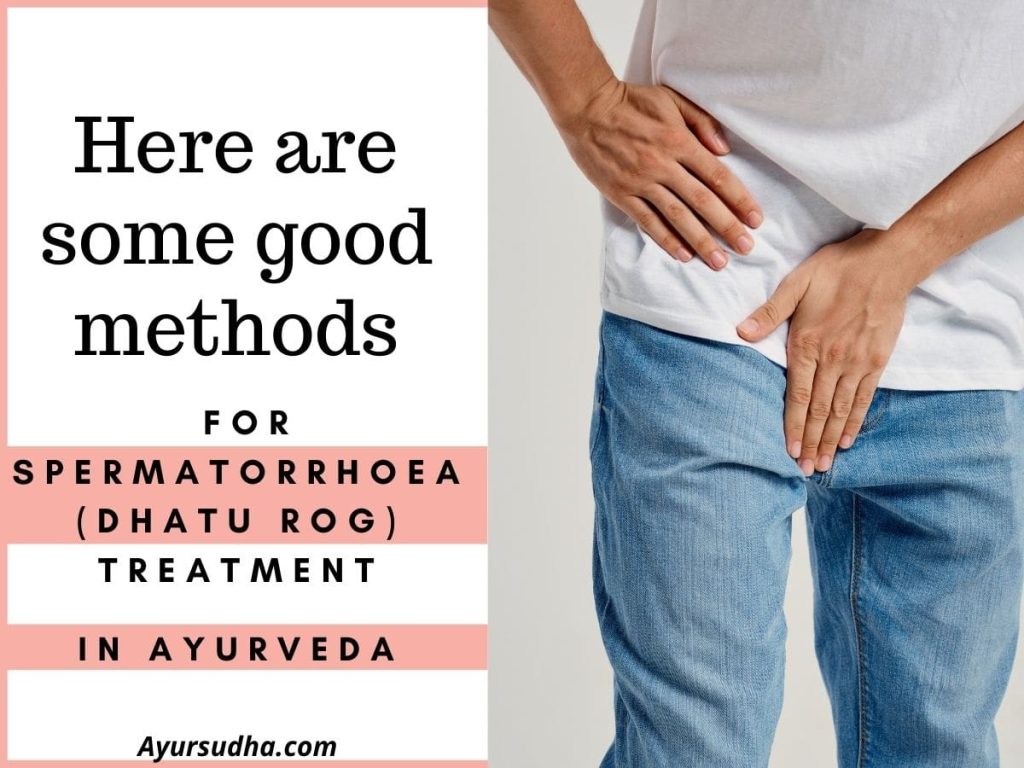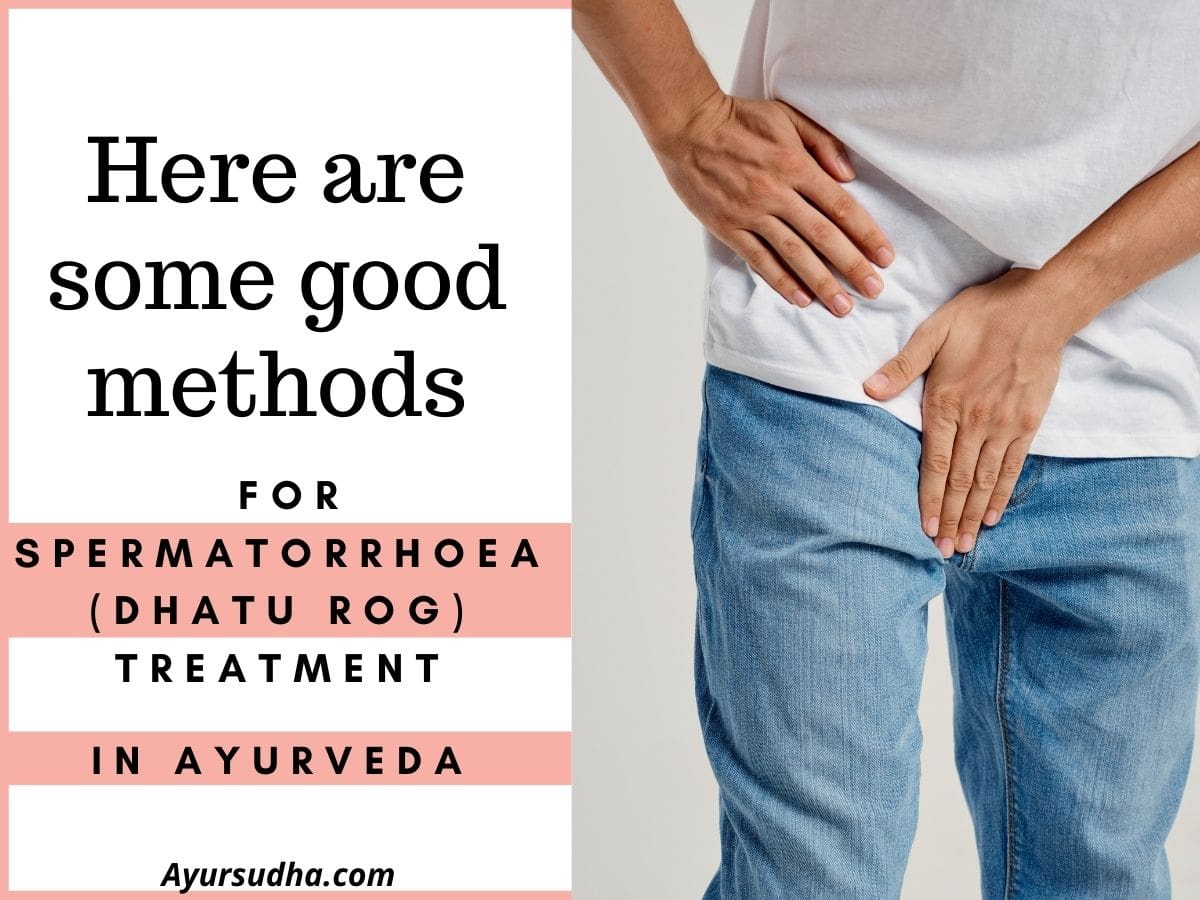Spermatorrhea Treatment in ayurveda
Even when there is no sexual activity taking place, ejaculation occurs involuntarily due to the condition spermatorrhoea. It can happen during the day when you’re awake or at night while you’re asleep or dreaming. Treatment of spermatorrhoea If spermatorrhoea occurs more than three times a week, combined with low energy, dizziness, insomnia, weakness in the lower back and legs, and other symptoms, it is regarded as a pathological condition. Spermatorrhoea treatment in Ayurveda Spermatorrhoea can be brought on by excessive sexual activity, masturbation, emotional instability, and alcohol usage, among other things.
In Ayurveda, spermatorrhoea is referred to as dhat syndrome, which translates as a semen-loss syndrome. Semen is a crucial component of the body, and excessive fluidity is a sign of semen loss, according to Ayurvedic specialists. For the treatment of illnesses of the reproductive system like spermatorrhoea, dietary modifications and herbal remedies are encouraged. Best spermatorrhoea treatment By restoring equilibrium to the vitiated Shukra dhatu, the panchakarma (five treatments) techniques of Basti (enema) and snehana (oleation) aid in the treatment of spermatorrhea. Spermatorrhoea treatment in Ayurveda Ayurvedic treatments for spermatorrhoea include herbs like ashwagandha (Indian ginseng), Bala (country mallow), and Guduchi (heart-leaved moonseed), as well as herbal preparations like abhrak bhasma.
spermatorrhoea treatment in ayurveda

Dhat syndrome (dhatu rog) as shown in Ayurveda (spermatorrhea):
Spermatorrhoea, or the loss of semen through nocturnal emissions, urine, and masturbation, is also known by the popular names Dhatu rog, Dhatu Dosha, Dhat syndrome, Shukrameha (Shukra = sperm + meha = passage in urine), and loss of semen. Best spermatorrhoea treatment It is regarded as one of the twenty varieties of Prameha that Ayurveda describes.
Spermatorrhoea treatment in Ayurveda The tissue system is referred to as Dhatu in Ayurveda. Treatment of spermatorrhoea The body is made up of seven tissue systems, or “Sapt Dhatus.” Shukra (semen) Dhatu, or reproductive tissues, are primarily regulated by Kapha. The Shukra Dhatu contains the essence of all the other Dhatus and is the most perfect of the seven Dhatus.
Shukra, a white, unctuous, dense, sweet, and thick material present in men, is described in Ayurveda as the force of life since it serves as garbhotpadana (reproduction). Additionally, it leads to a man’s improvement in appearance, athletic prowess, intelligence, and memory. Consequently, semen loss has been linked to mental unhappiness, memory problems, and a loss of vigor. best spermatorrhoea treatment The loss of semen or substances similar to semen, such as shuklameha (a white substance in urine), shukrameha (semen in pee), and sitameha, has been referenced in the Charak Samhita (cold and sweet urine).
Treatment for spermatorrhea with Ayurveda (dhat syndrome)
There are numerous Ayurvedic treatments available to treat Dhatu rog. These drugs may be herbal or mineral herbal. It is best to use herbal and mineral medications under physician supervision. Spermatorrhoea treatment in ayurveda These medications are typically given with milk. Garlic, fried food, and spicy food should be avoided while receiving therapy.
- Katsina (hip bath)
- Hip baths are helpful in the treatment of any ailment involving the vaginal, anal, and perineal areas of the body.
- The person is instructed to sit in a tub of water with his legs outside the tub while the procedure is carried out.
- This soak is invigorating and reviving. It eases tension in the muscles and enhances blood flow.
- A hip bath can ease postpartum discomfort, treat piles, ease the perineum after childbirth, ease the pain of the prostate in cases of prostatitis, and help keep the genital and anal areas clean.
- With lukewarm water and a large zinc bathtub, it may be done at home. Following a bath, dry towels should be used to wipe and warm clothing should be put on.
- A cool hip bath might calm the genitourinary system’s nerves. The reduction of nocturnal spermatorrhoea using this procedure is especially beneficial.
- An Ayurvedic enema known as Basti treatment includes administering a medicinal decoction, oil, or paste into the large intestine.
- Depleting enemas are used to reduce body fat, oleation enemas are used to lubricate the body, and purifying enemas are used to remove toxins from the body.
- Convulsions, helminthiasis, anorectal problems, lithiasis, ascites, articular illnesses, genitourinary ailments, and other conditions can all be helped by Basti therapy.
- One of the key herbs used in Ayurveda for rejuvenation is ashwagandha. Spermatorrhoea ayurvedic treatment It contains fungicidal, astringent, aphrodisiac, antibiotic, anti-inflammatory, tonic, and immune-modulating qualities in addition to constricting tissues and eliminating fungi.
- Ashwagandha improves muscle strength and semen quality in men. It also enhances the health, vitality, and intelligence of the bone marrow.
- Numerous medical disorders, including hypertension, diarrhea, rheumatism, chills, anemia, tuberculosis, scabies, alcoholism, arthritis, psoriasis, and asthma, are treated with ashwagandha.
- Shatavari is generally used to treat illnesses affecting the immune system and problems affecting the female reproductive system.
- It is tonic, anti-dysenteric, aphrodisiac, and appetising.
- Shatavari aids in the treatment of cancer, inflammation, hematemesis, rheumatism, hyperacidity, lung and kidney issues, and dehydration.
Different Dhat Syndromes:
- Only Dhat: The patients in this case experience hypochondriac symptoms that they blame on the sperm loss.
- Dhat followed by depression or anxiety: In this case, depression or anxiety are the most likely side effects of Dhat.
- Erectile dysfunction, sexual dysfunction, or other psychosexual dysfunction circumstances, such as depressive neurosis or anxiety neurosis, may occur in patients with depressed neurosis or anxiety neurosis.
Spermatorrhoea treatment in Ayurveda Some of the factors that vitiate the Shukra dhatu and cause dhat syndrome include having sexual relations before marriage, getting little physical exercise, having too much sex or having an excessive amount of sexual desire, drinking little water, harming the dhatus, engaging in sexual activity in the spring, worrying or grieving, having sex during the day, and eating unhygienic foods. Spermatorrhoea ayurvedic treatment Spermatorrhoea can also be caused by old age and the vitiation of other dhatus. Lack of energy, a shrinking penis, lack of energy, a burning feeling when urinating, a lack of motivation, mental disease, depression, and mineral loss are all symptoms of Dhat syndrome.




